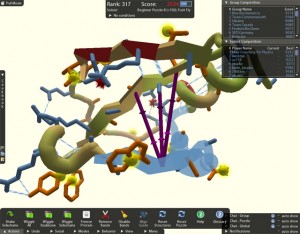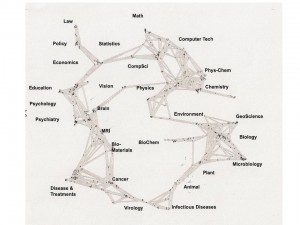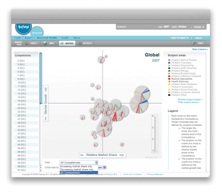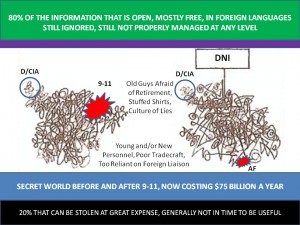 FULL STORY: Declassified (newsweek.com/blogs)
FULL STORY: Declassified (newsweek.com/blogs)
May 28, 2010
By Mark Hosenball
On Dennis Blair’s last day in office as director of national intelligence, the Obama administration seems more stymied than ever in its efforts to replace him.
Following a torrent of criticism from Capitol Hill—apparently touched off by this Declassified interview with Rep. Pete Hoekstra, the House Intelligence Committee’s top Republican—the candidacy of James Clapper looks doubtful to say the least. On top of Hoekstra’s criticism of the retired three-star general, who currently serves as the Defense Department’s intelligence chief, the Senate Intelligence Committee’s leaders are now also publicly saying they think he’s the wrong man for the job.
. . . . . .
The latest boomlet in speculation on potential candidates is centered on Michael Vickers, a former Green Beret and CIA operative who has been the Defense Department’s top civilian in charge of counterterrorism and special-operations programs slnce late in the Bush administration. Vickers was one of 15 potential DNI candidates we identified when news of the job opening broke….
. . . . . . .
But other names keep coming up. Some, such as Homeland Security undersecretary Rand Beers, Joint Chiefs of Staff Deputy Chairman Gen. James Cartwright, and outgoing Sen. Evan Bayh, have surfaced before (one former official who worked in national security positions with Beers describes him as “indefatigable”). But others are new to this particular search, including Rep. Jane Harman, former Ambassador to Iraq Ryan Crocker, and former CIA deputy director John McLaughlin.
 Phi Beta Iota: Worth a complete read. Here are the fifteen potential DNI's they identified earlier:, followed by our picks.
Phi Beta Iota: Worth a complete read. Here are the fifteen potential DNI's they identified earlier:, followed by our picks.
Political and bureaucratic heavyweights:
FBI Director Robert Mueller
CIA Director Leon Panetta
Deputy Secretary of State James Steinberg
Marine Gen. James Cartwright, deputy chair of the Joint Chiefs of Staff
Intelligence and defense technocrats:
Lt. Gen. Jim Clapper, currently Defense Department intelligence supremo;
Michael Vickers, assistant defense secretary for special operations;
John Hamre, a former deputy defense secretary;
Harvard academic Joseph Nye, also a former senior Pentagon official; and
John McHugh, a former GOP congressman whom Obama named as secretary of the Army.
High-profile intelligence politicos:
John Brennan, the White House counterterrorism and Homeland Security supremo; or
Rand Beers, a former career intelligence official who left his job as a senior counterterrorism adviser in the George W. Bush White House to become national security adviser to Democratic presidential candidate John Kerry, and now serves as undersecretary of Homeland Security
High-profile politicos:
former Sen. Chuck Hagel, a Republican close to Obama; former congressman and
intelligence-reform campaigner Lee Hamilton;
former Indiana senator Evan Bayh; and
former representative Tim Roemer (another intel-reform campaigner who is now U.S. ambassador in India)
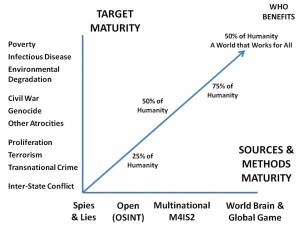 Phi Beta Iota: Everyone in the above lists is a ridiculous untenable suggestion with one exception: Senator Chuck Hagel. His combination of integrity, substantive experience, standing on the Hill, and general non-partisan common sense, is ideal. What he lacks is a kick-ass deputy who actually understands all the crap that the agencies–and their den mother Jim Clapper–put forward. Leon Panetta would actually be very good as the Deputy, responsible for turning off all funds to all agencies at 20% a year (10% a year restored for new initiatives; savings to education and national research under DNI oversight as provided for in the Smart Nation-Safe Nation Act) but Hagel is going to need a kitchen cabinet of truth-tellers and we are pretty sure he is not even aware of who they might be. That is his sucking chest wound–if he solves that he will not only earn Obama a second term, he will transcend politics and impact directly on the totality of all budgets–US, state & local, other nations, corporations, NGOs. Jack Devine is in the wings in New York, the Trilateral Commission's choice for either DNI or Director of Central Intelligence, he has our vote for the latter position.
Phi Beta Iota: Everyone in the above lists is a ridiculous untenable suggestion with one exception: Senator Chuck Hagel. His combination of integrity, substantive experience, standing on the Hill, and general non-partisan common sense, is ideal. What he lacks is a kick-ass deputy who actually understands all the crap that the agencies–and their den mother Jim Clapper–put forward. Leon Panetta would actually be very good as the Deputy, responsible for turning off all funds to all agencies at 20% a year (10% a year restored for new initiatives; savings to education and national research under DNI oversight as provided for in the Smart Nation-Safe Nation Act) but Hagel is going to need a kitchen cabinet of truth-tellers and we are pretty sure he is not even aware of who they might be. That is his sucking chest wound–if he solves that he will not only earn Obama a second term, he will transcend politics and impact directly on the totality of all budgets–US, state & local, other nations, corporations, NGOs. Jack Devine is in the wings in New York, the Trilateral Commission's choice for either DNI or Director of Central Intelligence, he has our vote for the latter position.
The problem President Obama has is in the White House is that no one working for him actually “gets it” with respect to 21st Century governance–between his pogomist and his pollster and his talented but oblivious others, he is running on fumes, will not get a second term, and is simply counting the days to when he can follow Bill Bradley, Al Gore, and Bill Clinton in Goldman Sachs honey-land–and screw the American public, they were never the intended beneficiaries of all this in the first place.
References for any future DNI:
Human Intelligence (HUMINT): All Humans, All Minds, All the Time (SSI, 2010)
The Smart Nation Act: Public Intelligence in the Public Interest (OSS, 2006)
Information Operations: All Information, All Languages, All the Time (OSS, 2006)
The New Craft of Intelligence: Personal, Public, & Political (OSS, 2002)
On Intelligence: Spies and Secrecy in an Open World (AFCEA, 2000; OSS, 2001)
and for the really big picture:
Intelligence for Earth: Clarity, Diversity, Integrity, & Sustainability (EIN, 2010)
Collective Intelligence: Crating a Prosperous World at Peace (EIN, 2008)
Peacekeeping Intelligence: Emerging Concepts for the Future (OSS, 2003)
